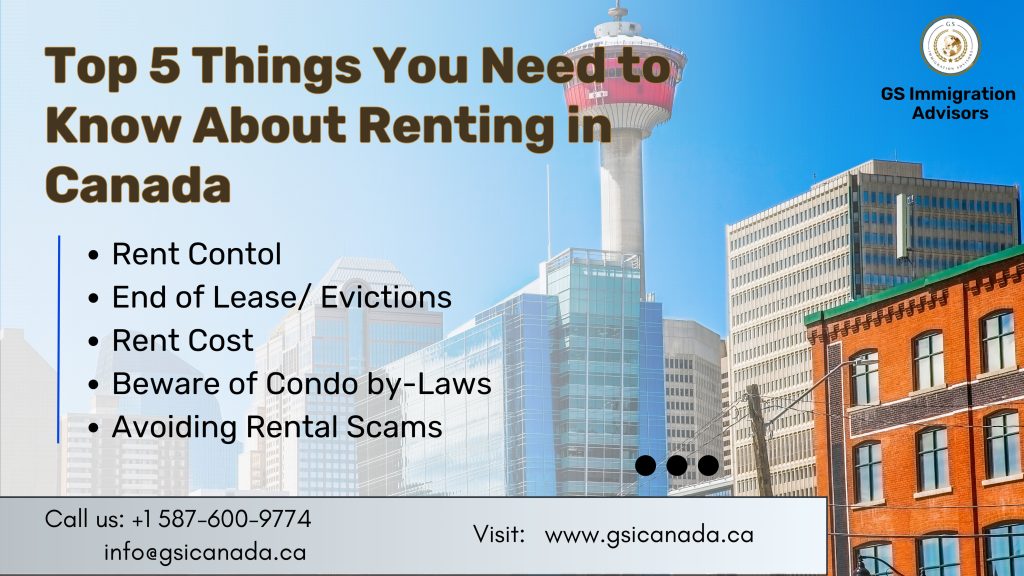
Navigating the rental market in Canada can be challenging, especially for newcomers. Understanding your rights and responsibilities as a tenant is crucial for making informed decisions. Here’s a concise guide to help you get started.
Rent Control Regulations
Some provinces in Canada have rent control laws designed to protect tenants from excessive rent increases. These regulations dictate:
- When and how much landlords can raise rent.
- The potential for significant savings if you choose a property under rent control.
If your property isn’t covered by rent control, be prepared for possible substantial rent hikes upon lease renewal.
The following table provides some detail on rent control in the applicable provinces:
| Province | Rent increase caps (2024, 2025) | Additional restrictions | Exemptions to rent control |
|---|---|---|---|
| British Columbia | 2024 rent increase limit: 3.5% 2025 rent increase limit: 3% |
Rent can be increased once every 12 months Landlords must provide 3 months’ notice Utilities and other fees can only be increased with tenant’s agreement |
|
| Manitoba | 2024 rent increase guideline: 3% 2025 rent increase guideline: 1.1% economic adjustment factor |
Rent increase guideline applies to most rental units | Units exempt from the guideline include high-rent units and government-owned properties |
| Ontario | 2024 rent increase guideline: 2.5% 2025 rent increase guideline: 2.5% |
Note: Rent control policies only apply to residential buildings first built or occupied before November 15, 2018 Rent can be increased once every 12 months Proper written notice of at least 90 days required |
Exceptions include new buildings and most new basement apartments |
| Prince Edward Island | 2024 rent increase guideline: 3% 2025 rent increase guideline: To be set annually by the Director of Residential Tenancy |
Rent increases can occur once a year Landlords must provide 3 months’ notice |
Increase above the allowable amount requires application to Rental Office |
Lease Terms and Evictions
Before signing a lease, consider the following factors:
- Lease Renewal: Understand whether your lease automatically renews or if you need to vacate at the end of the term.
- Notice Period: Know how much notice you must give to terminate a month-to-month lease. Generally, this is one month, but in provinces like Prince Edward Island and Ontario, you may need to provide two months’ or 60 days’ notice.
- Eviction Grounds: Familiarize yourself with the reasons landlords can evict you. Common grounds for eviction include:
- Non-payment of rent
- Property damage
- Breach of lease terms
- Health and safety violations
- Disrupting other tenants
Landlords may also evict you for reasons outside your control, such as the need to sell the property, personal use of the unit, or if the building is deemed unsafe. They must provide written notice of eviction, and you have the right to dispute it through local tenancy boards or tribunals.
How much should I expect to spend?
The cost of renting can vary significantly depending on the property and its location. Be sure to budget accordingly.
The table below shows the median monthly rent for some major cities for bachelor, 1-bedroom, and 2-bedroom apartments (source: zumper.com rent research portal).
| City | Bachelor/Studio apartment (median rent in Canadian dollars) | 1-bedroom apartment (median rent in Canadian dollars) | 2-bedroom apartment (median rent in Canadian dollars) |
|---|---|---|---|
| Toronto (ON) | $1,900 | $2,335 | $2,969 |
| Vancouver (BC) | $2,315 | $2,650 | $3,650 |
| Calgary (AB) | $1,599 | $1,790 | $2,297 |
| Edmonton (AB) | $1,154 | $1,389 | $1,650 |
| Winnipeg (MB) | $931 | $1,325 | $1,725 |
| Montréal (QC) | $1,487 | $1,700 | $2,195 |
Understanding Condo Regulations
Condominiums (condos) are a unique type of rental property in Canada, often subject to specific bylaws. When renting a condo, keep the following in mind:
- Condo Bylaws: These may impose stricter rules than residential leases, including:
- Restrictions on pets
- Limits on the number of occupants
While the Residential Tenancies Act in Ontario prohibits such restrictions for other residential properties, they may be permissible in condos. Be aware that condo regulations can change, potentially affecting your living situation.
Avoiding Rental Scams
Unfortunately, rental scams are common and can jeopardize your finances and personal information. Here’s how scams typically operate:
- Fake Landlords: Scammers pose as landlords or agents, showing you a rental unit at an attractive price. After you sign a lease and pay a deposit, you discover they are not authorized to rent the property and have disappeared with your money.
- Identity Theft: Scammers might request personal information and use it to impersonate you for fraudulent activities.
To protect yourself from scams, verify the legitimacy of the landlord or leasing agent. The Canadian Mortgage and Housing Corporation (CMHC) suggests watching for these warning signs:
- Rent significantly below market value
- Requests for deposits without a formal lease
- Security deposits requested to be sent to an address outside Canada
- Offers for rentals without a background check
- Emails directing you to websites asking for personal or financial information
- Ads featuring only external photos or mismatched property images
By staying informed and vigilant, newcomers can successfully navigate the rental market in Canada.